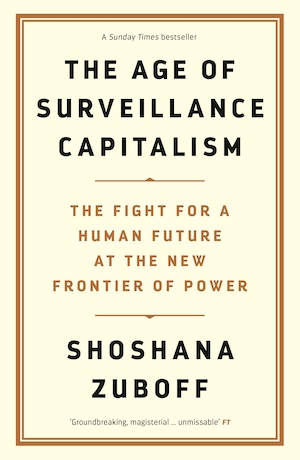We live in era in which we are constantly watched. Private corporations, led by Google and Facebook, are engaged in a surveillance campaign so pervasive and sustained as to exceed the wildest dreams of the East German Stasi. They know who you are, and who you know. They follow you everywhere you go. They read your mail and bug your conversations. Everything you do online, and an increasing proportion of what you do offline, is tracked, measured, analysed. Some of this information we volunteer; most of it is simply taken, without our knowledge or consent. In The Age of Surveillance Capitalism, Shoshana Zuboff shows how we arrived at this point, explores the forces driving the spread of surveillance, and considers the threats this surveillance poses to our society.
Zuboff pinpoints the dot-com crash of 2000 as the year zero of surveillance capitalism. As investors fled the tech sector, Google needed to tap new sources of revenue to survive. Google had already begun modelling users’ behaviour as part of improving their search engine. These models became the product Google sold to other businesses, businesses that wanted to know who was most likely to buy their products and how those people could be influenced. Google soon found a rival in Facebook, equally keen to make money from its knowledge of the social network. A host of others followed in their wake, including Microsoft and Amazon.
When you’re selling knowledge of people’s behaviour, the more accurately you can predict that behaviour, the more valuable your product. This means that the surveillance capitalists are constantly striving to open up new seams of data for mining. Every new service from Google — Gmail, Maps, Pay, Glass — is a means of extracting more information about your behaviour. But there is a second way to predict behaviour more accurately: make human behaviour itself more predictable. It is not enough that we be milked like cattle — we are also to be whipped and driven to market. Recent scandals such as Cambridge Analytica are the first warnings of the impact this behaviour modification could have on democratic societies.
The Age of Surveillance Capitalism is an important book. Zuboff establishes an essential conceptual framework for understanding how surveillance capitalism operates. In particular, her “dispossession cycle” neatly outlines the manner in which these companies invade our privacy, fend off legal action until the invasion becomes normalised, and finally make small surface changes to mollify complaints while continuing to extract all the data they can. Expect to see years of heel-dragging and resistance to GDPR while intrusive practices become ever more entrenched. Read this book. And turn your phone off while you do — Google Assistant is watching you.







Recent Comments